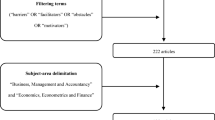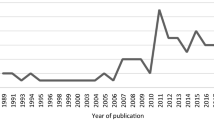Abstract
Academic entrepreneurship at universities allows students to leverage entrepreneurship education, entrepreneurial activities and university resources, when exploiting the deep knowledge of their research. The establishment of a new research university in NYC—Cornell Tech—offered the opportunity to experiment with a startup postdoc program, initiated there, called Runway, examining technology transfer by postdoc startups based on the notion that committed postdocs could be effective agents in commercializing their research. The program has unique features that differentiate it from incubator and accelerator programs. It is framed and structured as a postdoctoral program embedded in and legitimated by the university’s research and education institutions; it provides entrepreneurial postdocs with a structured educational program for translational research and company founding to transform them from scientists into entrepreneurs; and it offers a simple, startup-friendly intellectual property and financial model. Action research, common in educational program experiments, was used as the research model. The program was launched in 2014 and has incorporated 25 postdocs and their startups. This program shows that a university startup postdoc track can be an effective channel for technology transfer, and provide a career option for Ph.D. graduates. Contributions to technology transfer and academic entrepreneurship research are discussed.
Similar content being viewed by others
Notes
The postdoc’s company.
References
Abrue, M., Demirel, P., Grinevich, V., & Karatas-Ozkan, M. (2016). Entrepreneurial practices in research-intensive and teaching-led universities. Small Business Economics, 47, 695–717.
Adam, A. F., & Fayolle, A. (2015). Bridging the entrepreneurial intention-behavior gap: The role of commitment and implementation intention. International Journal of Entrepreneurship and Small Business. https://doi.org/10.1504/IJESB.2015.068775.
Astebro, T., Bazzazian, N., & Braguinsky, S. (2012). Startups by recent university graduates and their faculty: Implications for university entrepreneurship policy. Research Policy, 41, 663–677.
Audretsch, D. (2014). From the entrepreneurial university to the university for entrepreneurial society. Journal of Technology Transfer, 39, 313–321.
Baum, J. R., & Locke, E. A. (2004). The relation of entrepreneurial traits, skill, and motivation to subsequent venture growth. Journal of Applied Psychology, 89, 587–598.
Blank, S. (2019). How to stop playing “Target Market Roulette”: A new addition to the lean toolset. https://steveblank.com/2019/05/07/how-to-stop-playing-target-market-roulette-a-new-addition-to-the-lean-toolset/ Accessed 7 May 2019.
Boh, W., De-Haan, U., & Strom, R. (2016). University technology transfer through entrepreneurship: Faculty and students in spinoffs. Journal of Technology Transfer, 41, 661–669.
Cassell, C., & Johnson, P. (2006). Action research: Explaining the diversity. Human Relations, 59, 783–814.
Chen, S., Huang, F., & Zeng, W. (2018). Comments on systematic methodologies of action research in the new millennium: A review of publications 2000–2014. Action Research, 16, 341–360.
Ciuchta, M. P., Letwin, C., Stevenson, R., McMahon, S., & Huvaj, M. N. (2018). Betting on the coachable entrepreneur: Signaling and social exchange in entrepreneurial pitches. Entrepreneurship, Theory and Practice, 42, 860–885.
Cometto, M. T., & Piol, A. (2013). Tech and the city: The making of New York’s startup community. New York, NY: Mirandola Press.
Dumont, E. (2015). Remodelling technology transfer. Nature Nanotechnology, 10(4), 184. https://doi.org/10.1038/nnano.2015.8.
Erikson, T. (2002). Entrepreneurial capital: The emerging venture’s most important asset and competitive advantage. Journal of Business Venturing, 17, 275–290.
Feldman, M., Feller, I., Bercovitz, J., & Burton, R. (2002). Equity and the technology strategies of American research universities. Management Science, 48, 105–121.
Francois, V., & Philippart, P. (2019). A university spinoff launch failure: Explanation by legitimation process. Journal of Technology Transfer, 44, 1188–1215.
Gruber, M., & Tal, S. (2017). Where to Play, 3 steps for discovering your most valuable market opportunities. London: Pearson.
Hoffer, T. B., Milesi, C., Selfa, L., Grigorian, K., Foley, D. J., Milan, L. M., et al. (2011). Unemployment among doctoral scientists and engineers remained below the national average in 2008. National Science Foundation InfoBrief SRS: NSF 11-308. http://www.nsf.gov/statistics/infbrief/nsf11308/nsf11308.pdf.
Huang-Saad, A., Fay, J., & Sheridan, L. (2017). Closing the divide: Accelerating technology commercialization by catalyzing the university entrepreneurial ecosystem with i-Corps. Journal of Technology Transfer, 42, 1466–1486.
Kolympris, C., & Klein, P. G. (2017). The effect of incubators on university innovation. Strategic Entrepreneurship Journal, 11, 145–170.
Marzocchi, C., Kitagawa, F., & Sanchez-Barrioluengo, M. (2017). Evolving missions and university entrepreneurship: Academic spin-offs and graduate start-ups in the entrepreneurial society. Journal of Technology Transfer. https://doi.org/10.1007/s10961-017-9619-3.
Mueller, B. A., Wolfe, M. T., & Syed, I. (2017). Passion and grit, an exploration of the pathways leading to venture success. Journal of Business Venturing, 32, 260–279.
National Science Foundation, Division of Science Research Statistics for 2008 (2018).
National Science Foundation, National Center for Science and Engineering Statistics. (2015). Doctorate Recipients from US Universities 2014.
Noh, H., & Lee, S. (2019). Where technology transfer originated and where it is going: a quantitative analysis of literature published between 1980–2015. Journal of Technology Transfer, 44, 700–740.
Reichert, S. (2019). EUA study. The role of universities in regional innovation ecosystems. Brussels: European University Association Publications.
Sagor, R. (2011). The action research guidebook (2nd ed.). Thousand Oaks, CA: Corwin.
Shane, S., Locke, E. A., & Collins, C. J. (2003). Entrepreneurial motivation. Human Resource Management Review, 13, 257–279.
Siegel, D., & Wright, M. (2015). Academic entrepreneurship: Time for a rethink? British Journal of Management, 26, 582–595.
Stokes, D. (1997). Pasteur’s quadrant. Basic science and technological innovation. Washington, DC: Brookings Institution Press.
Toole, A. A., & Czarnitzki, D. (2010). Commercializing science: Is there a university “brain drain” from academic entrepreneurship. Management Science, 56, 1599–1614.
Van de Ven, A. H. (2007). Engaged scholarship: A guide for organizational and social research. Oxford: Oxford University Press.
Vohora, A., Wright, M., & Lockett, A. (2004). Critical junctures in the development of university high-tech spinout companies. Research Policy, 33, 147–175.
Wright, M., Siegel, D., & Mustar, P. (2017). An emerging ecosystem for student start-ups. Journal of Technology Transfer, 42(4), 909–922.
Author information
Authors and Affiliations
Corresponding author
Additional information
Publisher's Note
Springer Nature remains neutral with regard to jurisdictional claims in published maps and institutional affiliations.
Shuli C. Shwartz: Formerly with the Jacobs Technion–Cornell Institute at Cornell Tech, NYC, USA.
Rights and permissions
About this article
Cite this article
de Haan, U., Shwartz, S.C. & Gómez-Baquero, F. A startup postdoc program as a channel for university technology transfer: the case of the Runway Startup Postdoc Program at the Jacobs Technion–Cornell Institute at Cornell Tech. J Technol Transf 45, 1611–1633 (2020). https://doi.org/10.1007/s10961-019-09764-7
Published:
Issue Date:
DOI: https://doi.org/10.1007/s10961-019-09764-7
Keywords
- Academic entrepreneurship
- Graduate students’ startups
- University spinoffs
- Translational research
- Technology transfer
- Action research




